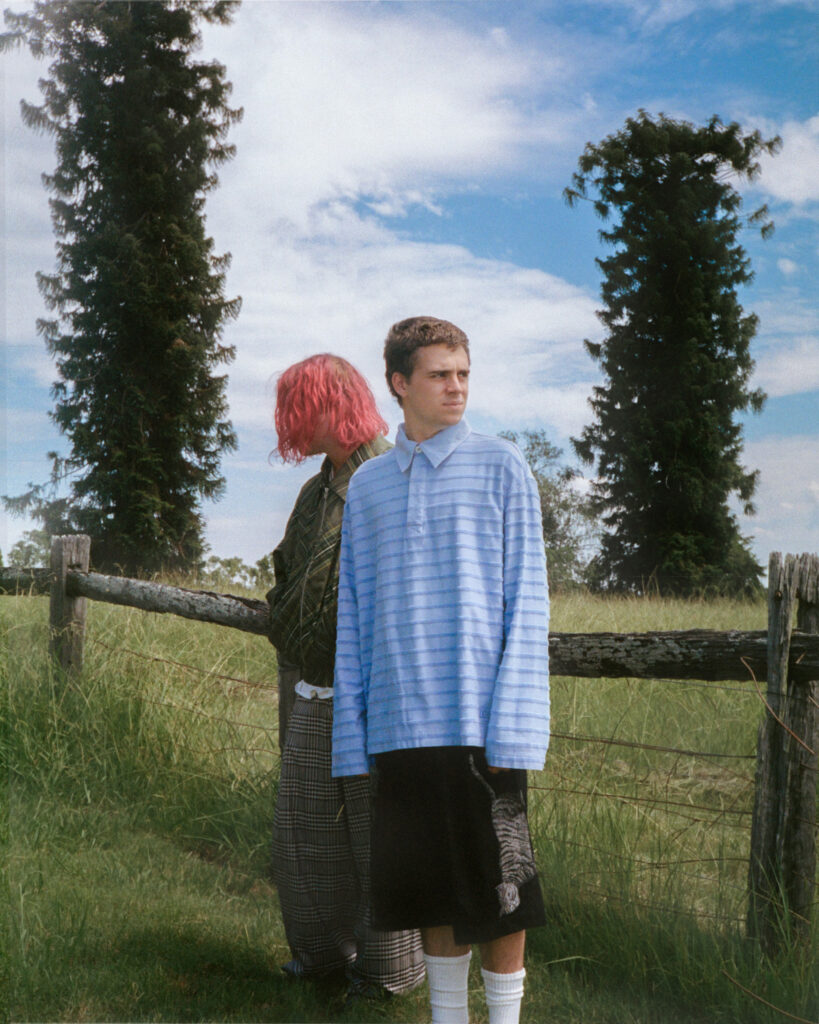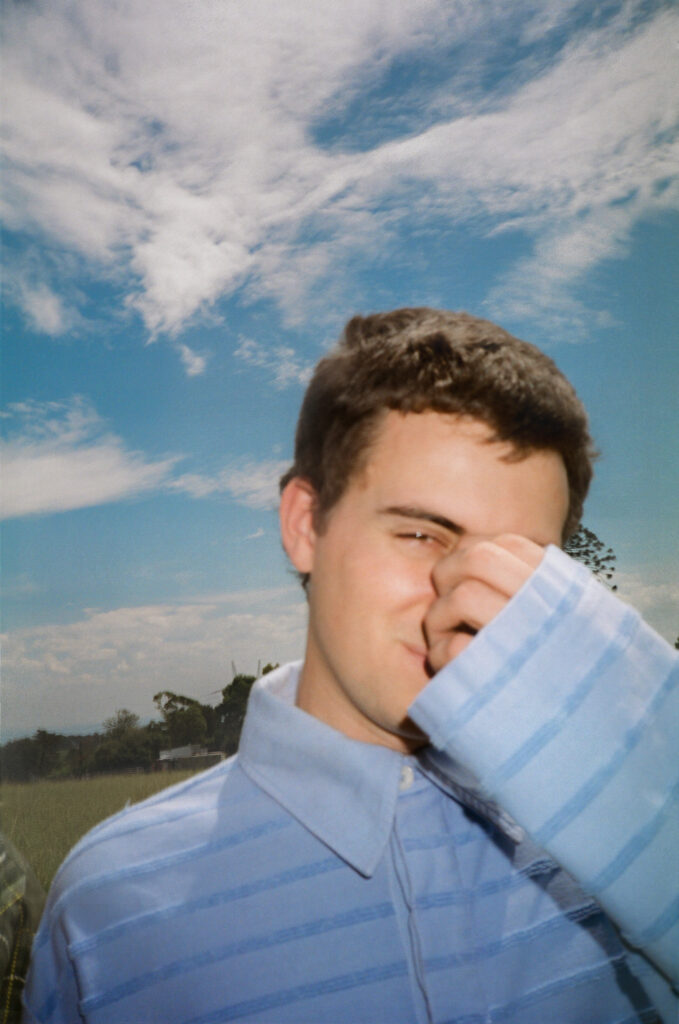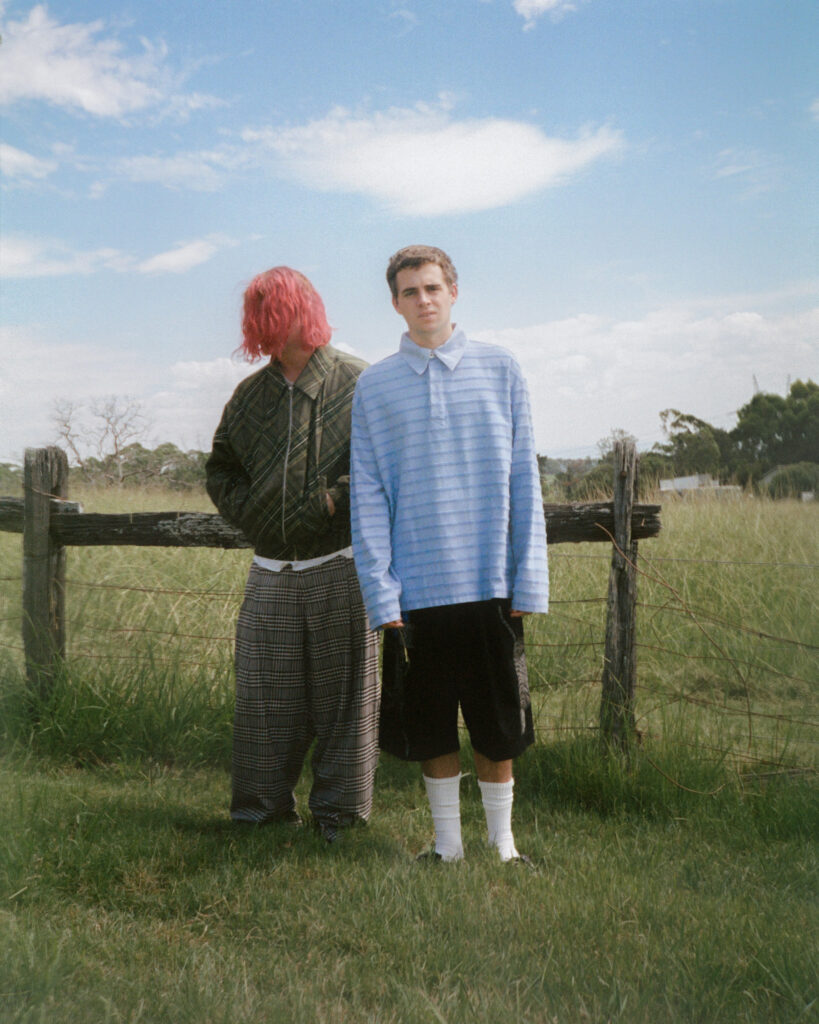Royel Otis Meets Us In The Middle
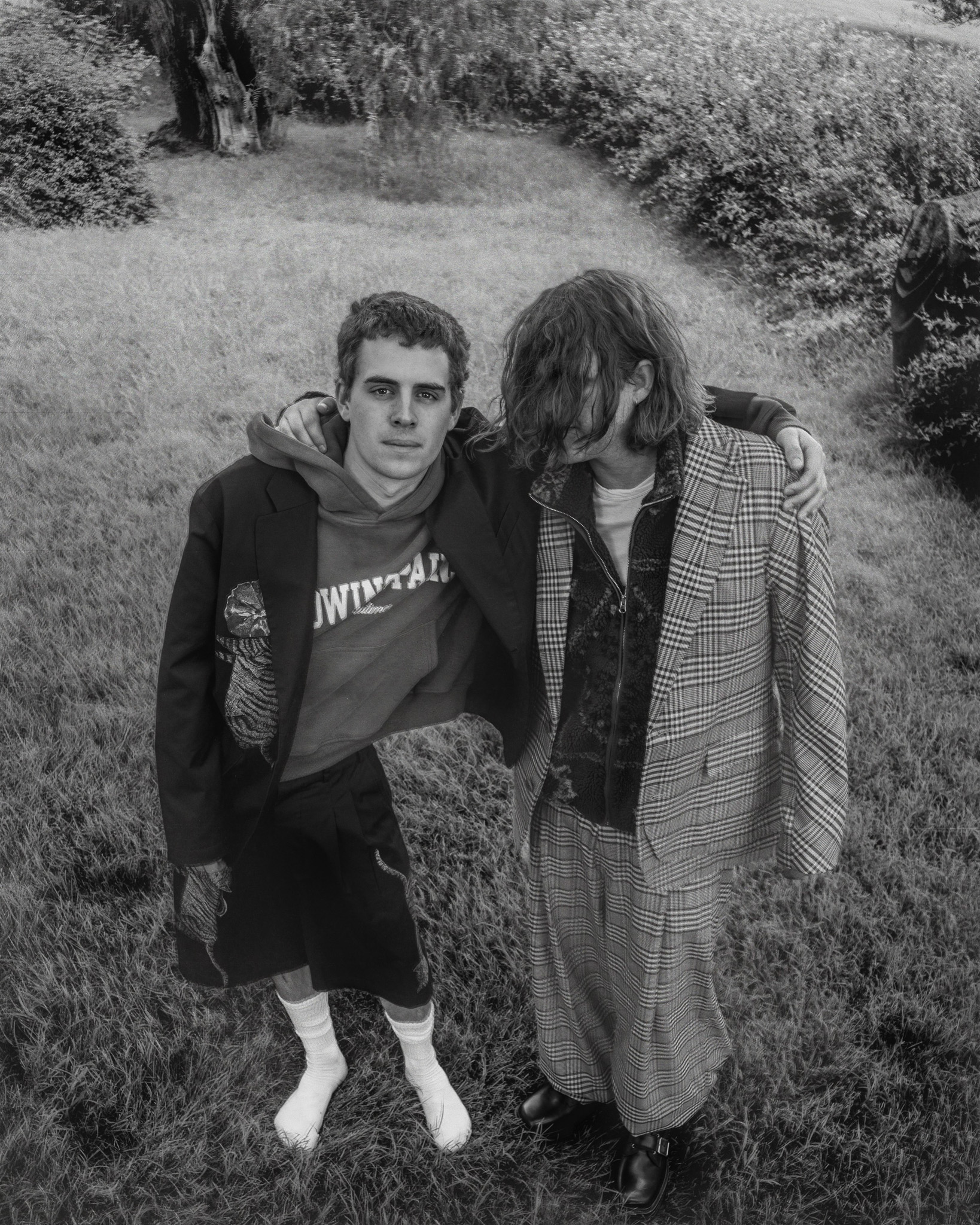
It was a Saturday, soon after the pandemic when live performances were just returning and the yearning to listen to real music was rife. We were at the Gasometer in Melbourne’s central north, upstairs in the brooding heat of a live venue that in ensuing months would lose its spunk. We were there to watch Royel Otis, a two-man band who had travelled from Sydney’s eastern suburbs to play all the songs they had produced at that time. They were young, shy, unknowing.
On their first chord, little called to mind the sweetness of young boys. No, Royel Maddell and Otis Pavlovic were confident and solitary. Their presence initiated a blunt, swelling energy. Their sound: old, nostalgic, obsolescent, as if produced after its time. Listening, we were out of our depths.
Otis and Royel formed their band after a succession of palavering. They released their first EP Bar N Grill in 2022 and, since then, have shared an eclectic catalogue of indie pop tracks, riddled with bass riffs, melodic vocals and bombastic drumming that culminated in their debut album Pratts and Pains in March 2024.
When meeting them properly, only weeks after the album’s release, the two held their own in a new way. Otis, with his chiselled jaw and dishevelled demeanour, carried himself like a young Andrew Reynolds. And Royel, with his heavy laugh and dyed red hair flattened to his skull, was sincere and soft. Still shy. Both still shy. Nonetheless, the crew and I, apprehensive and overly appeasing, felt at ease with them. Here were musicians who found each other, shared a mutual vision and executed it. RW
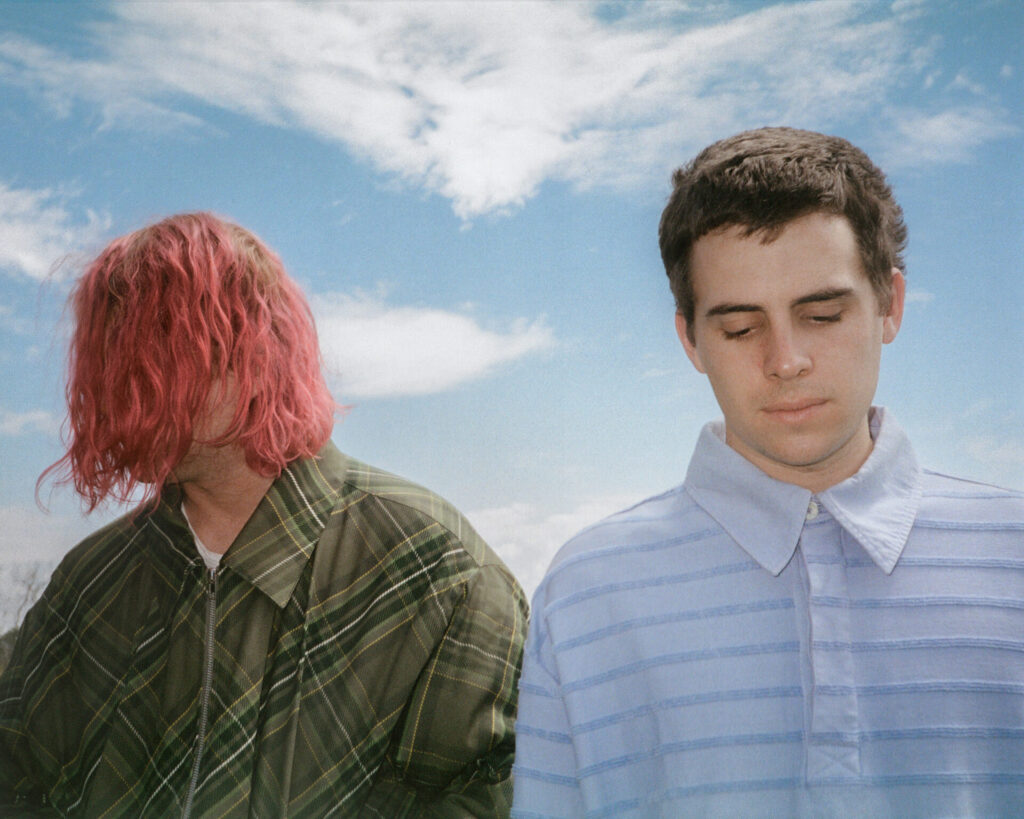
NOAH FUZI And then there were three. Let’s start from the beginning, growing up in Sydney and [on the] Central Coast. Tell me what it was like becoming the people you are.
ROYEL MADDELL Central Coast was dodgy. I lived in a pretty rough area with a fair bit of housing commission. I was living just with my mum. My dad lived in Bondi, so I’d spend weekends with him going to the movies. As soon as I finished school, I left the Central Coast and never went back.
Did watching movies and listening to film soundtracks influence your interest in music?
RM Definitely. I remember going to see School of Rock with my dad, and then—
OTIS PAVLOVIC You wanted to be Jack Black?
Everyone did.
RM I think more influence came from my brother’s skating and bodyboarding videos. Like full VHS, old-school shit.
And the music that they chose to play with the footage?
RM Yeah, I remember The Cure was on one of them. ‘Why Can’t We Be Friends’ by War was on one. And then, was it 411? The old skate mag. Heaps of shit on that.
Did you ever dabble in bodyboarding or skating? Or just always music for you?
RM Skating. I skated a lot. Always went down to The Entrance, ripped some cones and tried doing a kicky over the box.
I’m still trying the same thing [laughs]. That’s interesting, though. You both have a background in skate. I feel like that bleeds through into the music. How about you, Otis? You grew up in Sydney?
OP Yeah, grew up in Bondi. I feel like from ages five to sixteen, I was mostly down at the skate park, just surfing and skating. And then, as soon as I finished high school, I met Roy and then we started.
I might take it back. You were at the skate park from 9 to 5. That was your day. No one really knew you were making music. Were you playing behind the scenes? When did that really start for you?
OP In primary school I was playing. Do you remember Luke Spidmore?
No.
OP He was my best mate in primary school. We used to sit at the front of IGA and busk and play guitar. I was always kind of into it. When I first started high school, I stopped playing guitar and singing, doing all that kind of thing. And then, I reckon, in year nine or ten, I started getting back into it. As soon as I graduated, I started recording some tunes.
And what was the reason for stopping? Did you lose the love?
OP Kind of, yeah. I went to Newtown, where music is a compulsory subject. I’d do it, but it wasn’t something I was focusing on or really into. Once I hit fifteen, sixteen, I started to get more into it.
You briefly mentioned this, but how did you two meet? What did you think of each other?
RM I think we met as kids because we’ve got family friends. My dad is really good mates with his uncle, and we went to the same sort of events. I think we also just met from being around Bondi. I was working in bars and stuff. I think you were working in a cafe as well, and my girlfriend at the time worked with your girlfriend at the time. I think, one night at the bar when I wasn’t working, but was there because I got half-price drinks [kiss face], we started talking. Otis showed me a song and at the time I didn’t realise he played music. We started talking about what music we liked and asking, ‘Have you heard this song? Have you heard this song?’ Once he finished travelling the seven seas, we met up to actually try and put something down. I think that was the song ‘Wait’, which is on our first EP.
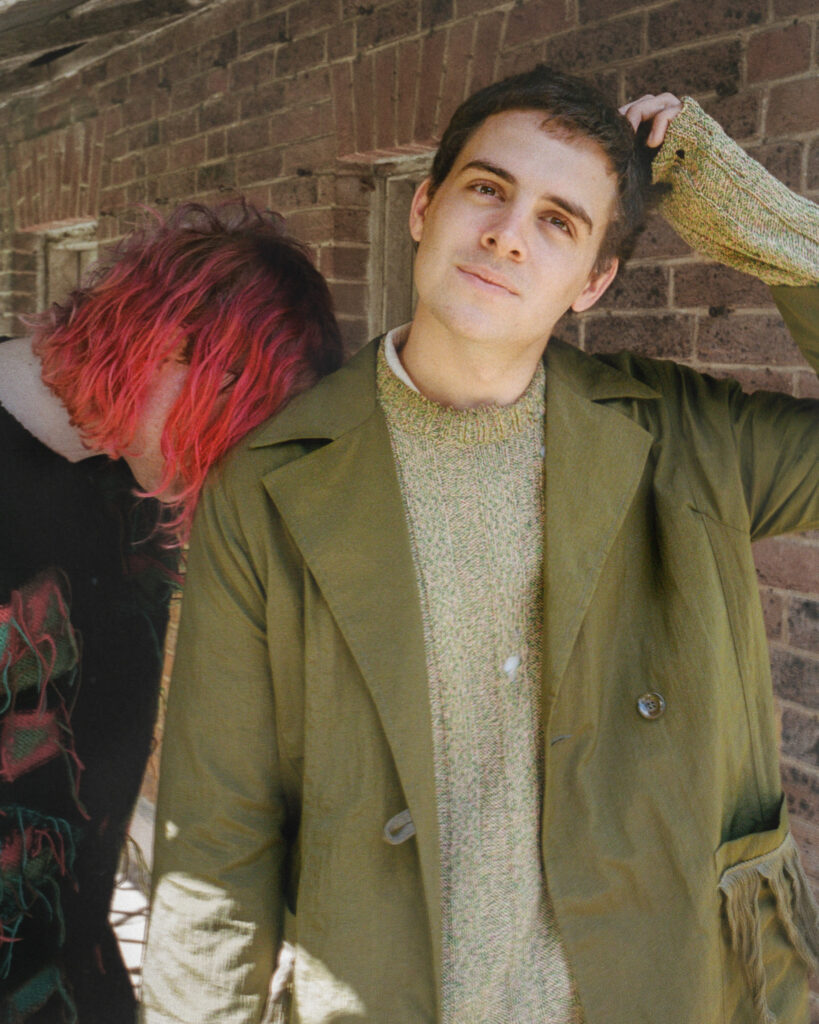
Otis, is your memory in a bar as well?
OP That’s where I saw Royel most. It was mostly at the Beaver. I met him once at the Oxford Art Factory, but he was high on mushrooms. I’d see him around like the Beachy or the Royal or the Diva.
How did you feel when you realised that Roy understood your vision? What was the feeling when the two of you got together those first few times?
OP I thought he had good taste in music and his guitar playing was sick. I was doing pretty basic gauges, and he was doing sequences over the top of it.
RM He was singing the way that I wished I could sing.
But you guys met each other in the middle.
OP I remember, Roy had his computer set up and with a little microphone and Ableton. It sounded so shit. But then he put reverb on the guitars and everything kind of sounded sick. From the start, we would talk about the stages of where we wanted our music to go. But that changed when we got in the studio with a friend and recorded our first EP, which was a longer process than anticipated.
RM Yeah, I think it was really organic, natural. We were referring to our plans as ‘waves’. Like, the first wave of songs will sound like this, and the second wave of songs will sound like this, and then third wave of songs a bit more psychedelic or experimental. But it didn’t exactly go to plan.
OP Not at all, but it’s worked out in a way.
It’s funny how life takes you in a different direction. You must feel like you’re almost on a bit of a roller coaster. It’s all just happening.
OP Exactly. And you change as well. When we first met each other, we talked about how we wanted to do things, but we’ve grown so much since then. I feel like, in a way, we’re probably less particular than when we first started.
RM We are less precious. We just don’t overthink as much. We want to capture the sort of urgency and spontaneity.
It’s about where you are now and how you can be true to that.
RM Yeah, for that very reason, I try not to listen to what we’ve recorded until it’s released. I don’t want to be over it by the time we get to play it live.
It’s cool to hear that your plan didn’t really go to plan, but you guys are still doing what you love. You’re still pursuing your vision.
OP Yeah. It probably ended up better than the plan.
Earlier, you spoke about 411 and bodyboarding videos and listening to those soundtracks. What were your other influences?
RM I got in heaps of trouble in high school. I got suspended seven times in one year. It’s nearly impossible to get expelled from a public school. The principal kept threatening me and my parents with expulsion, but they knew that was just a holiday for me. So, I got assigned to a music teacher, which is why I started playing music. It was something to occupy my brain and get all my energy out. I’d just sit and listen to Metallica songs and play them with a shitty little multi-effect zoom pedal that I had. I had the cheesiest metal sounds that I would play through a tiny amp. I think that’s probably the most influential part of my life: getting in trouble and then being forced into music.
Wow, that’s so sick. I love that. Music and skating or even bodyboarding, it’s an act against normality, right? It’s like, I’m going to go do something left of centre. The school offering you music was a really good move.
RM Yeah.
How about you, Otis?
OP I felt like I was always surrounded by music. My dad is a massive fan of the Pixies and that whole era of music. As I was getting older, I found I was just spending a lot more time down at the music studio and just hanging out with more of the music nerd kids. There wasn’t really a certain time where I thought, this is what I want to do. I feel like skating probably had an influence too.
RM Video games as well.
OP Video games, yeah. Tony Hawk’s Pro Skater 3. That soundtrack is really good.
Oh, I love that soundtrack. It’s funny, I don’t know if you guys do this, but a song will come up and I’ll ask, who skated to it? Do you think that there’s similarities between skating and music? Like, working on a trick versus working on a song.
OP Patience.
RM Yeah, I think the culture as well is pretty similar. If you’re skating, especially if you’re doing it professionally, you’re doing a lot of touring and there’s a lot of partying involved. I think the cultures go pretty hand in hand, especially with punk music or hip hop. That’s what I picture when I think of skating. But I stopped skating after I got hit by a car and broke my leg in three places.
Holy shit.
RM I feel so weak and sensitive if I get on a skateboard now. Before I was throwing myself off, like, 13 steps, not really giving a shit, not thinking about my ankles. And now, I don’t know if I can roll down.
When did that happen?
RM A few years ago. It’s all right now. It still hurts because I’ve got a lot of screws and plates in both legs.
I’m glad you’re okay.
RM Thank you. But, yeah, I think it’s a similar lifestyle. And if you fail at wanting to be a professional skater, you end up pretty much the same as if you fail at wanting to be a professional musician. You just have all the drug and alcohol problems with no money.
Yeah, for sure. And, Otis, you said patience. Do you think you developed your work ethic from those skating times?
OP I feel like when you’re a kid in skating, you develop a work ethic because you have these ideas of what you want to do and tricks you want to try, but it takes so long to get there and gain the confidence to do that. The same with music. You’ve got these ideas, but it takes so much time to actually nail them. But, like anything, you have to practise. Keep it going.
You have to be persistent, consistent, especially when defining your style. You don’t just start; you have to develop.
OP Yeah, exactly. It takes time.
I kind of want to talk about what you guys feel about the music industry and where you sit in it. Even what you think of Australian music at the moment.
RM Well, we’re not allowed to say this, but I personally don’t like how social media–focused the music industry is at the moment. We didn’t want to be influencers who play music. We want to play music.
How come you’re not allowed to say that?
RM Because TikTok and Instagram support us so much and we’ve got so many fans on there. On all those platforms. Well, I’m speaking for myself. I think you feel it a bit too, Otis. I’m not confident in front of a camera. I don’t like filming myself doing anything. I don’t like the sound of my voice.
OP You get thrown in the deep end of it. It’s a weird thing. I feel like back, even 15 years ago, bands had a sort of mystery about them. You didn’t need to know their whole daily routine. They just put out the music, put an image out with it, and let the fans think for themselves. These days it’s just the complete opposite. We have to throw it down their throat. We live in a world where if we want to do music, we have to kind of do all of that.
But it’s about finding a balance.
OP Yeah, exactly.
RM Or you can be like Frank Ocean and just bail on all of it. Completely go off grid.
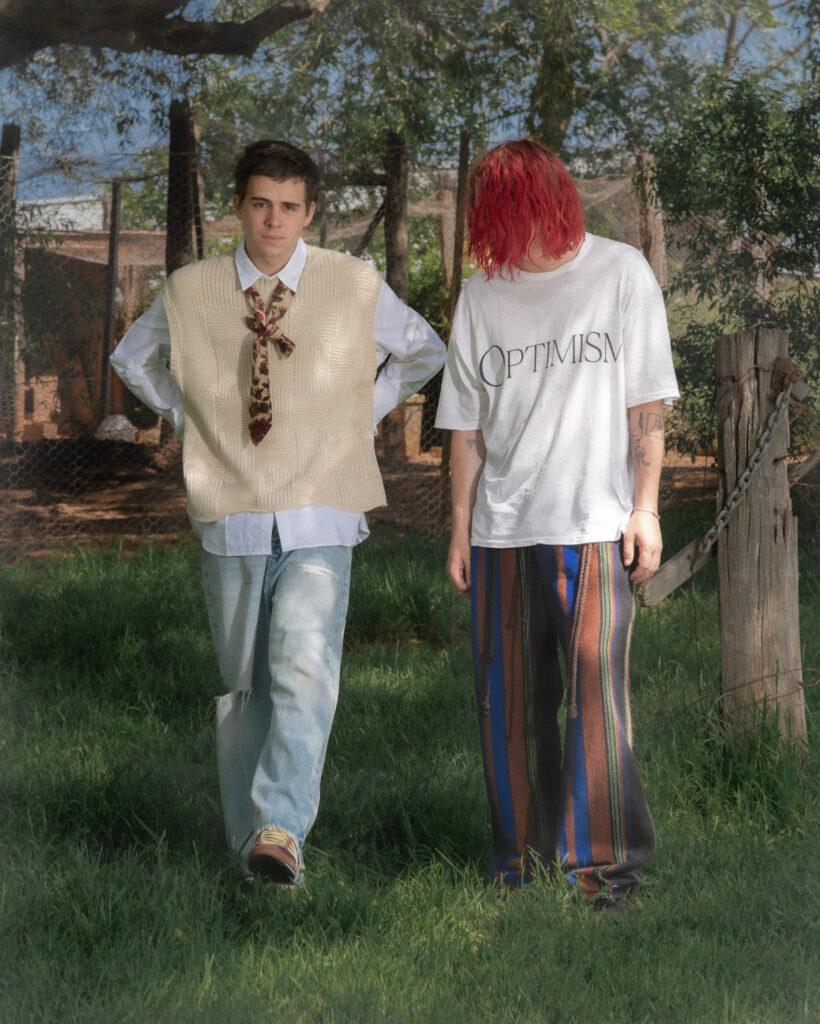
PAVLOVIC wears FRED PERRY shirt, HOPE vest and jeans, ADIDAS shoes from PRIME, stylist’s own tie
MADDELL wears stylist’s own t-shirt, SONG FOR THE MUTE pants, PRADA loafers
When I was growing up, there was this allure around the pro skaters because they put out one video part a year, and that’s all you saw. You made up the ‘in-between bits’ of what they were doing. No one knew. Now you see what someone’s doing, what they have for breakfast.
I think you should know though, you are both doing a really good job. I think a lot of people want to connect with you and they want to see what you’re doing. And you keep that image. But you also make sure that, at the end of the day, when fans really want to come find out who you are, they come see a show or they buy your physical album.
RM I do think the positive side to the music industry is being able to interact with fans. Social media makes that so much easier. But, yeah, the music industry is not what we realised it was going to be when we started.
OP It’s come with its own challenges.
RM Yeah, we’re learning as we’re going.
Which artists do you think are doing it right and who are you inspired by?
OP The band that supported us in Melbourne, Radio Free Alice. They’re cool.
RM They seem so sure of themselves and the sound that they want as well. I think Tyler, the Creator and Mac DeMarco are two people that fucking did it right. They were sure of who they were, it seems, and they didn’t give a fuck. And I think that’s contagious. It makes you want to be involved in their world. I think they’ve nailed everything. Start to finish.
I can see that sort of influence. They are people who made their image and just stuck to it. ‘This is who I am. Take it all.’ Roy, can you tell me why you started covering your face with your hair, and how you are feeling about it all now?
RM I think it wasn’t supposed to be hair. Originally, I didn’t even want to be a physical part of the band. I just wanted to be behind the scenes. And then, once the band sort of evolved, I was like: okay, I think I need to be part of this. And it was easy during lockdown because everyone had to wear masks. Now, I cover my face out of pure insecurities. I don’t like looking at myself in photos or videos or anything. It’s not a sort of ploy to be mysterious or anything. I just feel more comfortable when I dress up in fancy dress than I do wearing normal clothing. I have more fun and I’m less self-conscious.
I still think you look beautiful, by the way. But if that makes you feel good and empowered, it’s all that matters, right?
OP Yeah, exactly.
Oh, man. You go through how many shirts now with the dyed hair?
RM The dyed hair was a mistake. People have said: ‘you hide your face, but you colour your hair a fucking colour that no one else has. What’s the point?’ They have a very good point. I just didn’t think that through.

MADDELL wears KOLOR suit from MASONS, MUTIMER vest, JIL SANDER boots, stylist’s own socks
I’d love to hear you both talk about what the prep is backstage when you’re about to go out for a set. What goes through your head? What do you like to do? What don’t you like to do?
OP I like to have minimal people in the room. I don’t like when friends and family are there. I like when it’s just Roy, Timmy and Jules. I like having a few beers and keeping everything light.
RM Yeah, definitely a few beers. And I like to play some sort of game, whether it’s cards, or pool, or just throwing a lid into a cup, just to keep our mind off it. I get extremely nervous. I think you do as well Otis, but you just manage to hide it better than I do.
But the nerves are a good thing, right? The nerves just mean you care. It’s about how you manage them. It’s about being present and taking that energy out on stage.
RM Yeah, I think the nervous energy comes across as just pure energy.
Well, I just have to say, knowing you guys and watching everything you’ve done, I’m so stoked for you. Even though it’s a tough job to find a balance, and sometimes you have to trade parts of your identity and who you want to be, you’re still killing it and it’s really beautiful to see.
OP Thank you, dude.
RM Thank you, man.
photography and creative direction GABE HANVEY
creative direction and production RACHEL WEINBERG
stylist JEMIMA MIKULIC
photography assistant NOAH FUZI
At the Dog Beach with Merryn Jeann
By Lisabel Link
HTRK and Actress' Sacred Ritual
By Adam Hollander
Stepping Out To See Within
By Hugh Barton
Devonté Hynes’ highly anticipated premiere at VIVID Live demonstrated his versatility as a composer and his humility as an artist
By Jonah Orbach
St. Vincent's Signs of Life
By Daniel Drazetic and Rachel Weinberg
MUSIC, SEX AND HEARTBREAK
By Sophie Martin
